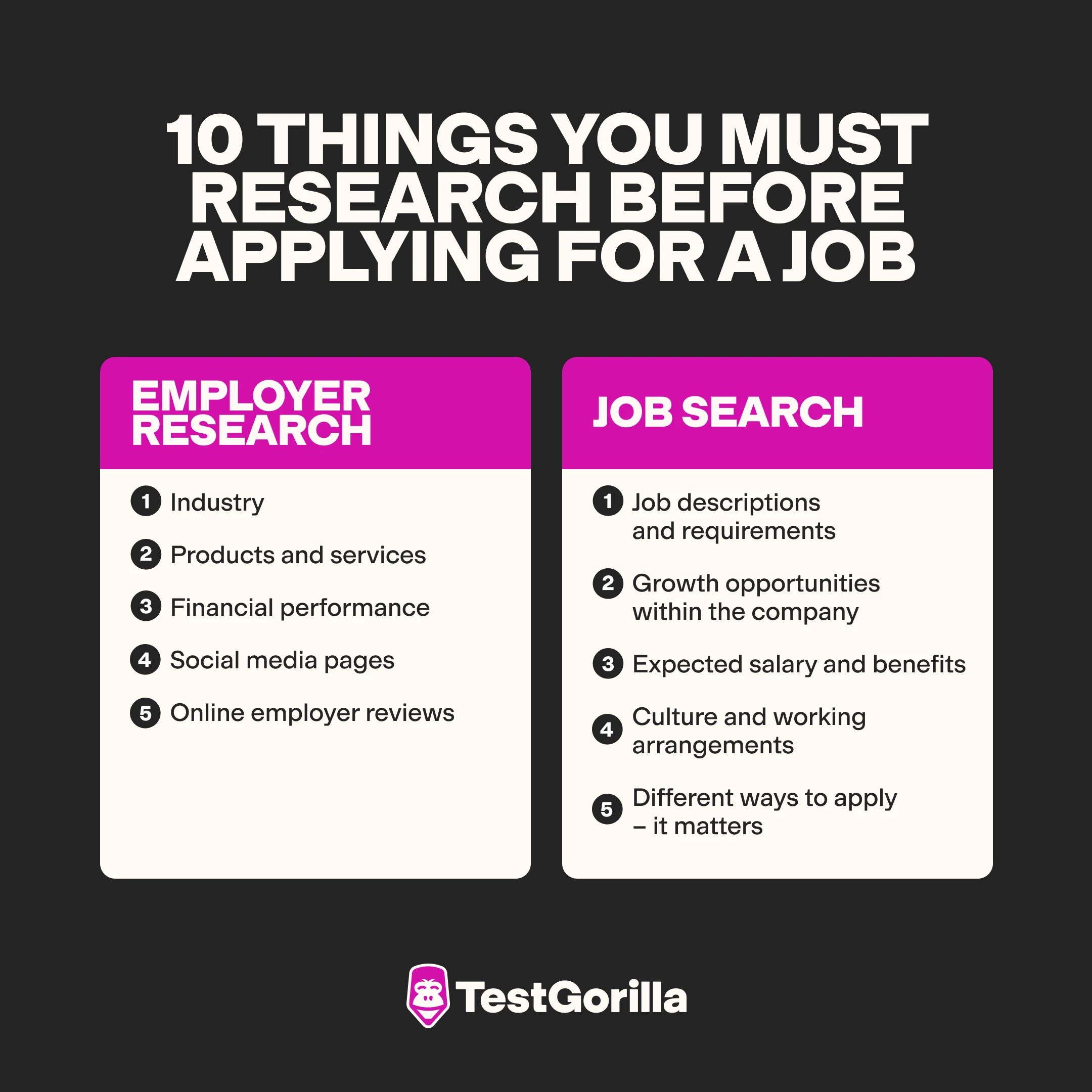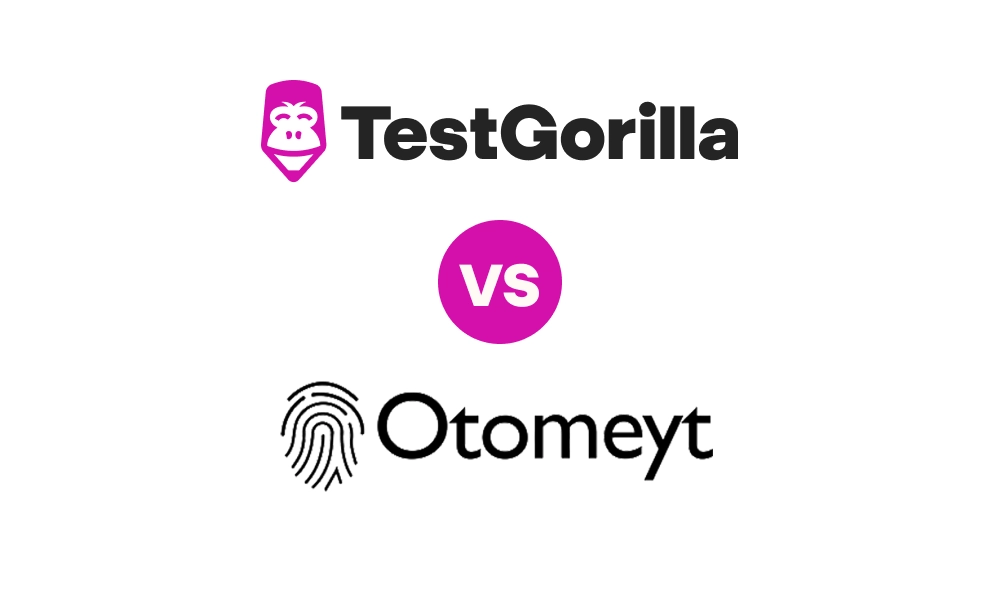Getting a good job in today’s economic climate is no mean feat. We get it: it feels easier to play the numbers game – send out as many applications as possible in the hopes of landing something – anything.
But here's the catch: rushing into applications without proper research could be a huge waste of time. Worse yet, you might land a job you don’t have the right professional skills for. Not only do you need to start your hunt from scratch, but leaving soon after joining will also be a red flag for future employers. Seems bleak, right?
Well, don’t sweat it. We’ve got your back.
In this guide, you’ll see why proper research is a game-changer. We’ll look at 10 things to help you narrow your options, apply the right way, and land that dream job.
Table of contents
What research will help prepare you before you apply for a job
When you’re applying for a job, you need to research two key areas. First, learn more about the employer, what they do, how they’re performing, and what their reputation is. Then, dig deeper into the job itself. What is the role? Does it match your skill set? Will you thrive in the team? Etc.
To keep you covered, we’ve provided this checklist of 10 things to research before you apply.
Employer research
Explore these topics to learn more about a potential employer.
1. Industry
Imagine starting a new role only to find out the industry is on a downturn. Or let’s say you start as a digital marketer in banking, to realize later that this regulated sector has a lot of restrictions on how you can promote products. Whatever your career choice may be, you need to go in with the right expectations.
That’s why it’s crucial to do your homework before you apply. Start by reading the latest industry news on websites like Bloomberg or Reuters. You can also access industry-specific journals, which are goldmines for this information.
Additionally, consider speaking to professionals from the field to learn about their challenges, industry trends, and what to expect in the future. Touch base with them at industry forums, networking events, or LinkedIn groups, where they often gather to discuss the nitty-gritty of their daily work.
2. Products and services
It's non-negotiable to research what a company actually does before you apply. Otherwise, you could waste time on a job only to realize you’re not into the company’s offering, making it tough to put your heart into your work.
The first thing to look at is the company’s website. The products or services page can give you a feel for what’s at the core of their business. Also, consider watching YouTube videos and reading customer testimonials, which often describe the offering in more detail.
But don’t stop there. Try to get first-hand experience with the company’s product where you can. So, if it’s a software company, you can download a trial of their web product or mobile app. If they sell physical goods, check out a few items in a store or look up online customer reviews to learn more.
3. Financial performance
An employer’s financial health directly impacts your job security and future growth opportunities. For instance, joining a company that's struggling financially could lead to constant stress over potential layoffs or missed salary raises.
So, how do you check a company’s financials? If it’s a publicly traded company, look at its latest earnings report, which should be on its website. This can give you insights into their profitability, revenue trends, and debt issues.
For private companies, digging on websites like TechCrunch can reveal news about recent funding rounds or major financial shifts.
Also, consider the broader economic context. For example, if the company’s stock is tanking while the whole sector is booming, that’s a red flag, especially if part of your offer includes equity.
4. Social media pages
Diving into a company’s social media pages can reveal a lot about its offering, culture, and popularity. For instance, a company with a high follower count indicates a healthy and well-liked brand.
You can also learn how a potential employer interacts with customers and handles questions and feedback on their pages. For example, are they upbeat and helpful, or do they ignore negative comments? This speaks volumes about their values and helps you decide if these resonate.
Other things to look at include post frequency and content quality, which can tell you more about their creativity and innovation and how serious they are about staying connected with customers.
5. Online employer reviews
Learn about a potential employer’s reputation on websites like Glassdoor. These platforms provide useful insights about a company’s culture, salary norms, and the pros and cons of working there, straight from current or past employees.
Be sure to get reviews from multiple sources and look for repeat issues, as these are more likely to be real problems. Be wary of bad one-off reviews, as they may have come from a disgruntled former employee and mightn’t provide an accurate picture.
Without this kind of inside information, you might waste time applying to a company with big red flags, such as high turnover rates or poor management practices. And the insights you gain can help you think of questions or concerns to address during interviews.
Job research
Look at these factors to check if you’re a good fit for a job.
6. Job descriptions and requirements
If you don’t match the skills or qualifications needed for the role, chances are that your application won’t make it past the first round. And even if it does, you could be setting yourself up for an embarrassing interview experience or find yourself accepting a job you’ll fail to perform in.
To avoid this, take your time to read the job listing thoroughly. Note down the skills, specific software proficiencies, and essential qualifications or certifications the employer is looking for.
This way, you can assess whether you’re a good fit for the role and know what to include in your application. Plus, you can speak to the hiring team if you have any concerns – for instance, if you’re skilled but lack a college degree and want an opportunity to interview.
7. Growth opportunities within the company
Researching the potential for growth within a company is a key step before applying for a job. You want to make sure there’s room to evolve – whether it’s future promotions or the ability to move horizontally to different roles to build your skill set. Otherwise, you could get stuck in a dead-end job and be hunting for a new role in no time.
To avoid this, examine the company’s career pages to see if they discuss learning programs, career growth opportunities, or employee development and mentorship opportunities. You can also ask the hiring manager or recruiter to walk you through these topics during the interview process.
For deeper insights, consider speaking to current or past employees who have progressed within the company.
8. Expected salary and benefits
Before applying for a job, make sure the pay and perks meet your expectations. There’s nothing more disappointing than getting late into the application process only to find out that the compensation or benefits packages are nowhere near your needs. It’s a waste of time and effort for both you and the hiring team.
To avoid such surprises, ask the recruiter specific questions about the pay range early in the process. Also, remember to research employee benefits such as healthcare, 401k, and any subsidies the company provides so you can negotiate confidently and know exactly how the role will support your financial and personal wellness goals.
9. Culture and working arrangements
An employer’s culture and working practices can dramatically affect your day-to-day happiness and productivity. Picture this: you’re looking for a flexible, open, and collaborative environment but apply for a rigid 9-to-5 office-only job.
In addition to checking the company’s website, social pages, and online reviews, you should speak to current or former employees about their experience with the company. Further, check the job description thoroughly, as it’ll likely tell you instantly if the role is on-site, remote, or hybrid.
Finally, ask the hiring manager or HR pointed questions about a typical workday, team dynamics, and flexibility options so you can apply for jobs where you can truly fit and thrive.
10. Different ways to apply – it matters
How you apply for the job makes all the difference in whether your application even reaches employers, so you must explore the pros and cons of different methods before applying.
For instance, applying through a company’s career page or job boards is straightforward but highly competitive. Your application could get lost in a sea of others and never be seen.
Some candidates send their resumes and cover letters directly to hiring managers or recruiters through email or LinkedIn. While this can show initiative, some employers might be annoyed by messages outside the specified process. And if they see your resume, you might be rejected for lacking a fancy degree, even if you have all the skills for the job.
That’s why we recommend applying for jobs through TestGorilla’s job board. Here’s how it works.
Explore the job board to find roles that match your skills and interests. Then, take relevant talent assessments on job-specific skills, cognitive abilities, personality traits, and even how you can fit in and contribute to companies’ cultures.
Employers will look at your test results rather than your resume or cover letter as the first step in their hiring process. If you’ve got the skills, you won’t go unnoticed, regardless of whether you meet formal degree requirements or other stipulations that aren’t strictly necessary.
This way, every candidate is fairly judged on their ability and matched with companies that value their real skills and potential.
Find your perfect match with TestGorilla’s job board
Researching a job before applying is critical to finding something that fits your needs and abilities. Plus, it’s not overwhelming or time-consuming when done right.
Looking into an employer’s industry, offering, social media, online reviews, and financial health can help you decide if this is a company you want to work for. Further, studying the role description, compensation, growth opportunities, and culture gives you insights into the specific job you’re considering.
Finally, don’t forget to explore how you want to apply for the position. Popular routes like career sites, job boards, and resume sharing can be competitive and biased. Instead, apply through TestGorilla’s job board, where you can prove your worth to employers through real-world skills tests rather than leaving your application to chance.
Apply via our job board and explore our extensive test library today.
Related posts
Hire the best candidates with TestGorilla
Create pre-employment assessments in minutes to screen candidates, save time, and hire the best talent.
Latest posts
The best advice in pre-employment testing, in your inbox.
No spam. Unsubscribe at any time.

Hire the best. No bias. No stress.
Our screening tests identify the best candidates and make your hiring decisions faster, easier, and bias-free.
Free resources
This checklist covers key features you should look for when choosing a skills testing platform
This resource will help you develop an onboarding checklist for new hires.
How to assess your candidates' attention to detail.
Learn how to get human resources certified through HRCI or SHRM.
Learn how you can improve the level of talent at your company.
Learn how CapitalT reduced hiring bias with online skills assessments.
Learn how to make the resume process more efficient and more effective.
Improve your hiring strategy with these 7 critical recruitment metrics.
Learn how Sukhi decreased time spent reviewing resumes by 83%!
Hire more efficiently with these hacks that 99% of recruiters aren't using.
Make a business case for diversity and inclusion initiatives with this data.


















